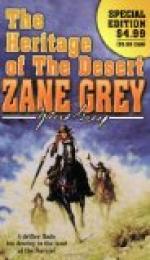Soon the shepherds were left to a quiet unbroken by the whistle of wild mustangs, the whoop of hunters, the ring of iron-shod hoofs on the stones. The scream of an eagle, the bleating of sheep, the bark of a coyote were once more the only familiar sounds accentuating the silence of the plateau. For Hare, time seemed to stand still. He thought but little; his whole life was a matter of feeling from without. He rose at dawn, never failing to see the red sun tip the eastern crags; he glowed with the touch of cold spring-water and the morning air; he trailed Silvermane under the cedars and thrilled when the stallion, answering his call, thumped the ground with hobbled feet and came his way, learning day by day to be glad at sight of his master. He rode with Mescal behind the flock; he hunted hour by hour, crawling over the fragrant brown mats of cedar, through the sage and juniper, up the grassy slopes. He rode back to camp beside Mescal, drove the sheep, and put Silvermane to his fleetest to beat Black Bolly down the level stretch where once the gray, even with freedom at stake, had lost to the black. Then back to camp and fire and curling blue smoke, a supper that testified to busy Piute’s farmward trips, sunset on the rim, endless changing desert, the wind in the cedars, bright stars in the blue, and sleep—so time stood still.
Mescal and Hare were together, or never far apart, from dawn to night. Until the sheep were in the corral, every moment had its duty, from camp-work and care of horses to the many problems of the flock, so that they earned the rest on the rim-wall at sundown. Only a touch of hands bridged the chasm between them. They never spoke of their love, of Mescal’s future, of Jack’s return to hearth; a glance and a smile, scarcely sad yet not altogether happy, was the substance of their dream. Where Jack had once talked about the canyon and desert, he now seldom spoke at all. From watching Mescal he had learned that to see was enough. But there were moments when some association recalled the past and the strangeness of the present faced him. Then he was wont to question Mescal.
“What are you thinking of?” he asked, curiously, interrupting their silence. She leaned against the rocks and kept a changeless, tranquil, unseeing gaze on the desert. The level eyes were full of thought, of sadness, of mystery; they seemed to look afar.
Then she turned to him with puzzled questioning look and enigmatical reply. “Thinking?” asked her eyes. “I wasn’t thinking,” were her words.
“I fancied—I don’t know exactly what,” he went on. “You looked so earnest. Do you ever think of going to the Navajos?”
“No.”
“Or across that Painted Desert to find some place you seem to know, or see?”
“No.”
“I don’t know why, but, Mescal, sometimes I have the queerest ideas when I catch your eyes watching, watching. You look at once happy and sad. You see something out there that I can’t see. Your eyes are haunted. I’ve a feeling that if I’d look into them I’d see the sun setting, the clouds coloring, the twilight shadows changing; and then back of that the secret of it all—of you—Oh! I can’t explain, but it seems so.”




